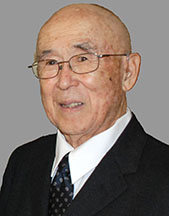1920 – 2009
Committed to social justice, equality, and education and services for oppressed and marginalized communities
A child of the Great Depression born to a farming family in California’s Central Valley in 1920, Kenji Murase dedicated his life to promoting social justice and improving resources for underserved groups in the San Francisco region and beyond.
An avid learner, Murase graduated as valedictorian of his high school class and was attending UC Berkeley in 1942 when he and his family were was taken to the Poston internment camp in Arizona. Through a national Japanese American student relocation program, he was allowed to leave the camp to attend Temple University, where he earned his Bachelor of Arts degree in 1944. Murase went on to earn his Master of Social Work in 1947 and his doctoral degree in social work in 1961, both from Columbia University. As the first American Fulbright Scholar in Japan in 1952, he taught social work at Osaka University and researched the needs of war orphans. When he returned to New York, he worked in the “flophouses” of the lower East Side and was field director of an anti-poverty program for African American and Puerto Rican households.
In 1967, Murase was recruited to join the faculty at the new School of Social Work at San Francisco State University, where he dedicated more than two decades to teaching, research, and scholarship. A leader in Council on Social Work Education (CSWE) and the NASW, as well as the first director for what became the Institute for Multicultural Research and Social Work Practice. Among his many accomplishments, Murase led a community survey to determine the long-term care needs of Japanese older adults, eventually leading to the creation of a $14 million assisted-living facility that features discounted units for older adults and their families with limited or fixed incomes. He also served as principal investigator of the Pacific Asian Mental Health Research Project, creating a knowledge base for Asian American, Native Hawaiian, and Pacific Islander communities to organize community-based mental health services.
As a board member of the Nisei Student Relocation Commemorative Fund, Murase helped design the first annual student award ceremony in 1983 for Southeast Asian refugee students attending college. Murase also served as a founding board member of the Japanese Cultural & Community Center of Northern California, an agency designed to preserve the cultural heritage of Japanese Americans. Established in 1973, the center now serves more than 185,000 individuals annually. In addition, he played a critical role in the formation of the Japanese Bilingual Bicultural Program in San Francisco schools, creating opportunities for children to learn the Japanese language and culture lost during the wartime incarceration of Japanese Americans.
Despite his busy schedule, Murase found time to publish articles in professional journals and other venues on topics of mental health, community development, and gerontology. After his retirement from San Francisco State University, he continued to devote his energy to various nonprofit organizations and community-based projects. Murase was a visionary who sparked essential changes for his field and for all of the communities he served.
